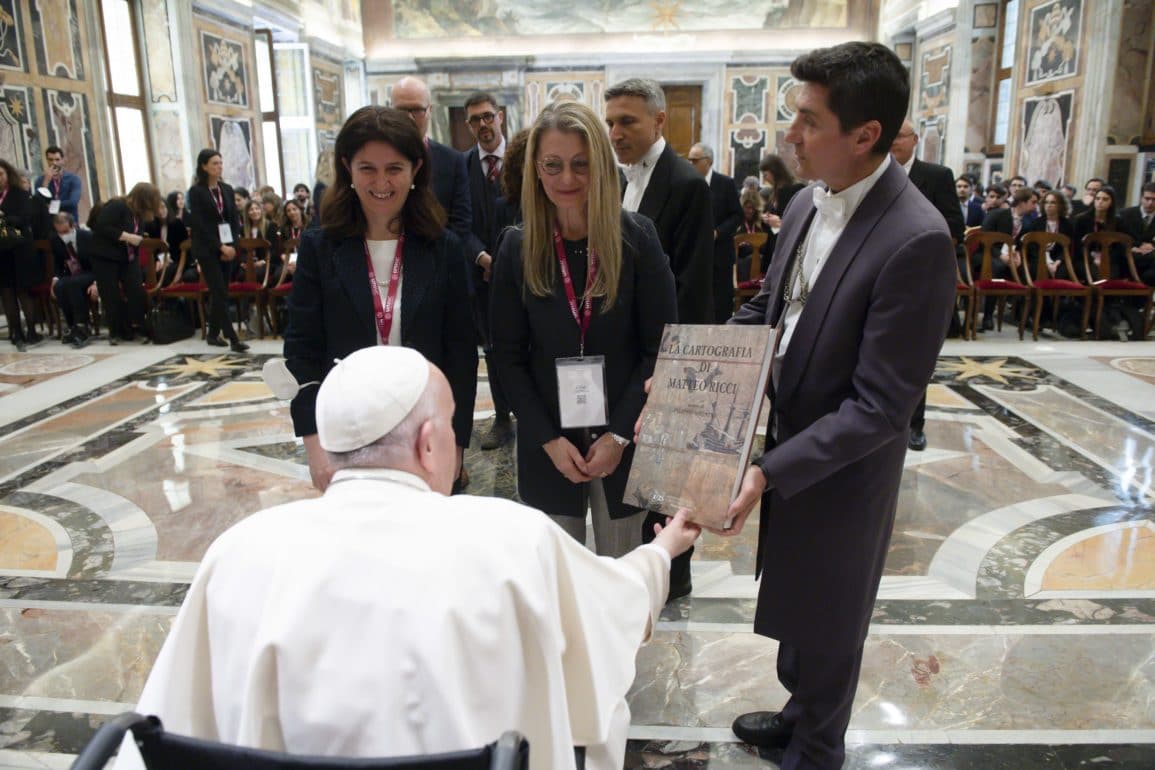Today, in the Vatican Apostolic Palace, the Holy Father Francis received in audience the students and teachers of the University of Macerata, to whom he addressed the following words:
Address of the Holy Father
Dear friends of the University of Macerata, welcome!
I heartily greet you all, and I thank the Rector for his introduction. I was struck by the fact that, in presenting your university, he did so bytaking a very broad perspective: the friendship between the West and the East; the encounter between different cultures; the drama of war; the phenomenon of migration – an interesting quote from Seneca! -and peace… But this, in fact, is what the university is all about! The university is – or at least should be – the place for opening the mind to the horizons of knowledge, to the horizons of life, of the world, of history. Naturally, starting from a precise perspective, from the in-depth and methodical study of a subject area, but always with an open mind, always for a holistic knowledge of the world and of man.
And this horizon, so to say, is doubled if we think that every person, therefore every student who crosses the threshold of the university and attends it for a number of years, each one of them is in themselves a universe. At university, then, two universes meet: that of the world, of knowledge, and that of man; not man in a generic sense, who does not exist, but of that precise person, that young man or woman, with his or her history and personality, dreams and intellectual, moral and spiritual qualities… and limits. Each individual person is a universe, that only God knows fully, with incomparable respect.
This, I would say, is the challenge of the university: to make these two horizons meet, that of the world and the personal, so that they may engage in dialogue, and that a growth in humanity may come from this dialogue. A growth, first and foremost, of the very person of the student, who is formed and matures in knowledge and liberty, in the capacity to think and to act, to participate critically and creatively in social and civil life, with his or her own cultural and professional competence. I am reminded of Saint John Henry Newman’s reflections on the university, where he writes that in the university environment “a habit of mind is formed which lasts through life, of which the attributes are, freedom, equitableness, calmness, moderation, and wisdom”, adding, “This then I would assign as the special fruit of the education furnished at a University, as contrasted with other places of teaching or modes of teaching. This is the main purpose of a University in its treatment of its students” (The Idea of a University, 1873, V, 1). This idea of a university has nothing to do with the one bequeathed to us by the Enlightenment, filling the head with things. It is the whole person that has to be involved there, his affections and the way he feels, not just the way he thinks, and also the way he acts. Human harmony can be found, not by thinking of the university as a factory of brainboxes who do not know what to do with their hands or hearts. This human idea of the university is important.
This human growth of people cannot but reflect positively on society. Therefore, investing in formation, schools and universities is the best investment for the future of a country. We know this, we hear it repeated frequently, but decisions are not always taken consistently.
I would like to emphasize another aspect, which was also touched on by the Rector: the encounter between different cultures. We are well aware that this is not automatic. It is not enough to bring together professors and students from different backgrounds. It is necessary to develop a culture of encounter. And the university is certainly a privileged place to do this. Macerata was the birthplace of a great “champion” of this culture, Father Matteo Ricci. He was great not only for the things he did and wrote, but he is great because he was a man of encounters, a man of the culture of encounter, a man who went beyond being a foreigner; he became a citizen of the world because he was a “citizen of people”. This is the culture of encounter. And, certainly, the university is a privileged place for this encounter. Macerata was the birthplace of this great champion: I congratulate you because you not only preserve his memory and promote studies on him, but you also try to bring into the present his example of intercultural dialogue. How much need there is today, at all levels, to resolutely pursue this path, the path of dialogue! How the powers of the world are accustomed to the road of exclusion, to the culture of rejection! No, there is a need for dialogue, the path of dialogue. “But wasting time with dialogue?”. Yes, “wasting time”, because this then bears fruit in a greater and more beautiful way.
Dear friends, I thank you for your visit and wish you all the best for the University. I cordially bless you and the entire academic community. And I ask you, please, to pray for me.










